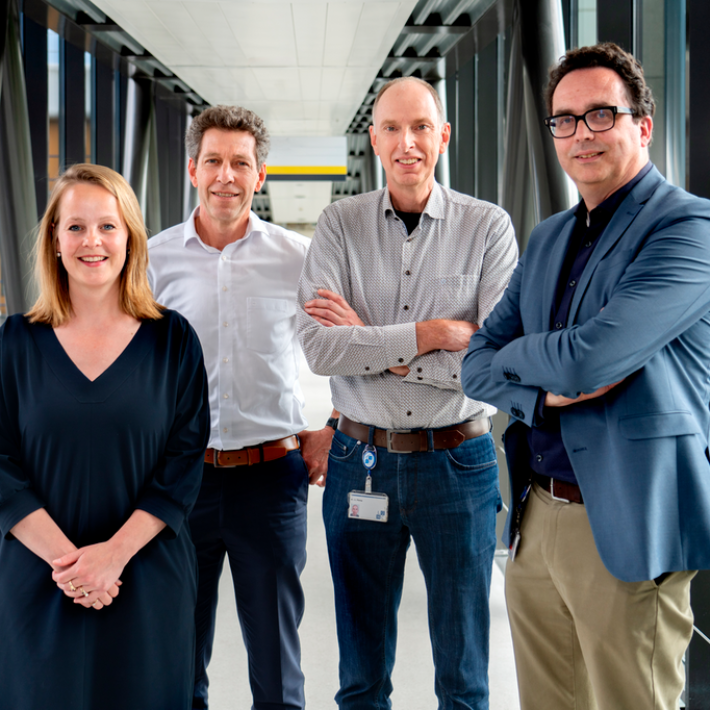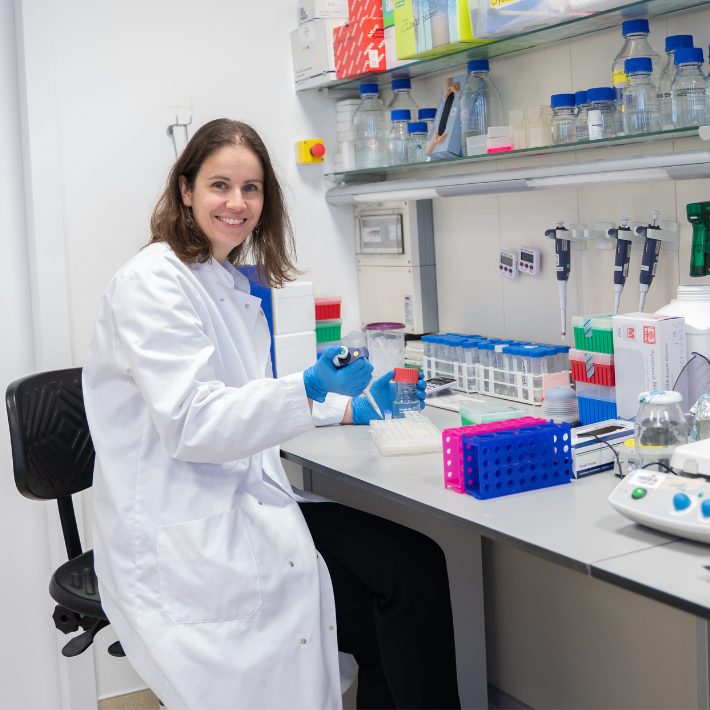Humane Genetica
De afdeling Humane Genetica levert een bijdrage aan de organisatie en de uitvoering van het reguliere onderwijs in de Bachelor en Master in de studierichting 'Geneeskunde' en 'Biomedische Wetenschappen'. Met name in de vakgebieden:
- Medische-, neuro- en tumor genetica;
- Metabole syndromen;
- Straling en bio-informatica.
Leden van de afdeling zijn betrokken bij het organiseren dan wel uitvoeren van het onderwijs voor diverse onderwijsblokken, FOS cursussen en minoren. Ook in commissies die blok-overstijgend werken is de afdeling ruim vertegenwoordigd. Verder is er in hoge mate participatie in vele extra‐curriculaire onderwijsactiviteiten. Zo geeft de afdeling bijvoorbeeld colleges bij andere universiteiten of hogescholen. En wordt er postacademisch onderwijs georganiseerd, met name binnen de Graduate School Medical Genetics Center South-West Netherlands (MGC).
…De afdeling Humane Genetica levert een bijdrage aan de organisatie en de uitvoering van het reguliere onderwijs in de Bachelor en Master in de studierichting 'Geneeskunde' en 'Biomedische Wetenschappen'. Met name in de vakgebieden:
- Medische-, neuro- en tumor genetica;
- Metabole syndromen;
- Straling en bio-informatica.
Leden van de afdeling zijn betrokken bij het organiseren dan wel uitvoeren van het onderwijs voor diverse onderwijsblokken, FOS cursussen en minoren. Ook in commissies die blok-overstijgend werken is de afdeling ruim vertegenwoordigd. Verder is er in hoge mate participatie in vele extra‐curriculaire onderwijsactiviteiten. Zo geeft de afdeling bijvoorbeeld colleges bij andere universiteiten of hogescholen. En wordt er postacademisch onderwijs georganiseerd, met name binnen de Graduate School Medical Genetics Center South-West Netherlands (MGC).
De afdeling beschikt over een onderwijscommissie. De onderwijs coördinator van de afdeling is dhr. prof.dr.ir. J.A.P. (Ko) Willems van Dijk.
Opleidingen
The Human Genetics department is a broadly oriented research department, zooming in on the (epi)genetic aspects of monogenous, multifactorial, and acquired diseases. Translating basic scientific findings into clinical relevance is pivotal to the department’s translational focus.
It has longstanding and intense collaborations worldwide and principal investigators of Human Genetics are involved as coordinator of or participant in several national and international initiatives.
Research programs
The department’s organizational structure is based on biological themes, interconnected by common technological and biological approaches.
The main areas of interest are:
- Neuromuscular and neurological genetics (muscle dystrophies, neurodegenerative diseases, migraine);
- Oncogenetics (breast and bowel cancer, paragangliomas);
- Genomic instability, toxicogenomics, DNA-damage and mutagenesis;
- Immunogenetics; epigenetics (repeats, primary immunodeficiencies, cancer);
- Population genetics (including forensic genetics and archaeogenetics);
- Metabolic genetics;
- Developmental genetics, especially renal diseases.
The department’s organizational structure is based on biological themes, interconnected by common technological and biological approaches.
The main areas of interest are:
- Neuromuscular and neurological genetics (muscle dystrophies, neurodegenerative diseases, migraine);
- Oncogenetics (breast and bowel cancer, paragangliomas);
- Genomic instability, toxicogenomics, DNA-damage and mutagenesis;
- Immunogenetics; epigenetics (repeats, primary immunodeficiencies, cancer);
- Population genetics (including forensic genetics and archaeogenetics);
- Metabolic genetics;
- Developmental genetics, especially renal diseases.
The connecting technologies are:
- Genome technology (genomics and transcriptomics);
- Bioinformatics and biosemantics;
- Genetic therapy;
- Animal models;
- Biobanking.
Research performed in the department is clustered in four LUMC research programmes and is host to several Technology Platforms and Facilities. Click on the links below for more information about the research programmes, the individual research groups and the Technology Platforms and Facilities.
The department is host to many PhD students from all around the world. The staff members provides education within the fields of Medicine and Biomedical Sciences and contribute to postgraduate and extra-curricular education both within and outside the LUMC.
Patient care is not carried out directly by the department. Patient-related tasks, often of a diagnostic nature, are largely carried out through close collaboration with Clinical Genetics and other departments within the LUMC.
Research groups
Research performed in the department is clustered in four LUMC research programs and is host to several Technology Platforms and Facilities. The department is organized in different research groups, Technology Platforms and Facilities.
Contactgegevens
LUMC – Human Genetics
Postzone S-4-P
Postbus 9600
2300 RC Leiden
Visiting address
Einthovenweg 20
2333 ZC Leiden
Secretariat
E-mail: humgen@lumc.nl
Phone: 071 526 94 00
Location: S-4-P
Team
Head of department
Prof.dr.ir. Silvère M. van der Maarel
Management assistant/Assistant for the head of department Prof.dr.ir. Silvère M. van der Maarel
Mrs. Majella E. Bak,
Phone: 071 526 94 19
E-mail: M.E.Bak@lumc.nl
Management assistant
Mrs. Ingrid Braxhoven,
Phone: +31 (0)71 5269601
E-mail: I.Braxhoven@lumc.nl
Head of department
Prof.dr.ir. Silvère M. van der Maarel
Management assistant/Assistant for the head of department Prof.dr.ir. Silvère M. van der Maarel
Mrs. Majella E. Bak,
Phone: 071 526 94 19
E-mail: M.E.Bak@lumc.nl
Management assistant
Mrs. Ingrid Braxhoven,
Phone: +31 (0)71 5269601
E-mail: I.Braxhoven@lumc.nl
Secretary
Mrs. Anita W. Remmelzwaal,
Phone: 071 526 94 51
E-mail: A.W.Remmelzwaal@lumc.nl
Secretary
Mrs. Jane S. Pleging-Veale,
Phone: 071 526 94 03
E-mail: J.S.Pleging-Veale@lumc.nl
Secretary
Mrs. Patricia Cabrera,
Phone: 071 526 94 06
E-mail: M.P.Cabrera@lumc.nl
Education coordination
Prof.dr.ir. Ko (J.A.P) Willems van Dijk
Phone: 071 526 94 70
E-mail: K.Willems_van_Dijk@lumc.nl
Office: S-3-40
Advisor Human Genetics
Mrs. Ing. Sophie Greve
Phone: 071 526 95 51
E-mail: S.Greve@lumc.nl
Office: S-4-44
Science committee Human Genetics
Mrs. Dr. Lucia Clemens-Daxinger
E-mail: L.Clemens-Daxinger@lumc.nl
&w=180&h=180)
&w=180&h=180)
&w=180&h=180)